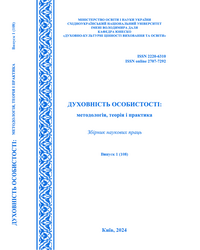ARTIFICIAL INTELLIGENCE AND SPIRITUALITY: CHALLENGES AND THREATS
DOI:
https://doi.org/10.33216/2220-6310/2024-109-2-77-86Keywords:
artificial intelligence, spirituality, challenges and threats, ethics and morals, existential questionsAbstract
The article is devoted to possible threats and challenges Artificial Intelligence (AI) may pose to human spirituality. It begins with identifying spirituality as an inevitable part of people’s lives that shapes their values, beliefs, and behaviours, provides a framework for understanding the interconnectedness of all beings and the universe with something greater than oneself, offering solace in times of crisis and a sense of purpose, connection, and inner peace. However, being a groundbreaking development in the field of technology, AI may lead to serious changes in the ways people believe, perceive themselves and their places in this world, and look for the meaning and purpose of their lives. AI may cause misinformation and misrepresentation of the data obtained. People may mistakenly perceive AI as that almighty source of knowledge or believe that there is nothing greater and mightier at all since the technology can give the answers to all their questions. Humiliation of human dignity and an insulting attitude towards people, the blurring of lines between human life and the activity of AI (including the issues of rights, responsibilities, freedom, decision-making, etc.), moral and ethical issues related to perceiving AI as a living being cause increasing concerns of the world technologists, philosophers, anthropologists, and theologians who are trying to find some ways to control the rapid spread and people’s obsession with AI. The author describes 4 main concerns related to the influence of AI on spirituality, namely, concentration, patience, and attention; selflessness; devoutness or adherence; and the knowledge of discovering and analysing ourselves. Besides, the article provides some analogies and differences between devices driven by AI and beings with spirituality. Finally, the author draws a conclusion that we must take responsibility for our lives and respond accordingly to what happens to us so as not to allow AI rule our life and spiritual experiences.

